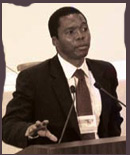
|
OF UNIVERSAL RIGHTS AND CONFLICTS THAT THREATEN HUMANITY
continued
AFTER APARTHEID
Another conference session focused on
“The Truth and Reconciliation Process,”
in particular the experiences of South Africa
following the fall of apartheid. On hand
for the discussion were Ahmad Kamal, the
founder and president of the Ambassador’s
Club at the United Nations, and former
ambassador of Pakistan to the United Nations,
and Sivuyile Sabelo Maqungo, deputy
representative of the permanent mission
of South Africa to the United Nations.
Kamal, who also is a member of Fairleigh
Dickinson’s Board of Trustees and
a visiting professor at the University, said
the history of the world is “about conflicts,
not conflict resolution.” But, “South Africa
rose above the desire for revenge [following
the dissolution of apartheid]. How did
this happen?” he asked. “Can we try to do
it elsewhere?”
Maqungo said that after the fall of
apartheid and multiracial elections, a
negotiated settlement produced a Truth
and Reconciliation Commission, which
provided amnesty in exchange for the full
disclosure of human rights crimes. “The
commission was a pragmatic solution to
political circumstances,” he said. “We had
to choose whether to continue to fight or
to find a way to live with each other. We
chose the pragmatic way.”
After describing the harassment of
his grandmother and the pursuit and
near death of his uncle under apartheid,
Maqungo asked himself if he could forgive
the perpetrators. “I cannot walk around
bearing the weight of anger. I proceed to
throw away that weight and live my life. I
forgive for my benefit.”
Next …
|
FDU Magazine Home | Table of Contents | FDU Home | Alumni Home | Comments
©Copyright 2007 Fairleigh Dickinson University. All rights reserved.
For a print copy of FDU Magazine, featuring this and other stories, contact Rebecca Maxon, editor,
201-692-7024 or maxon@fdu.edu.
|





